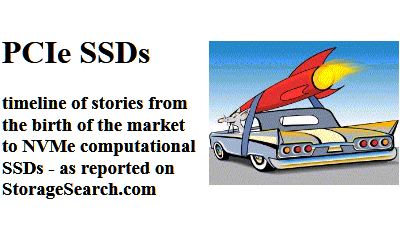Hewlett Packard Enterprise is
an industry leading technology company that enables customers to go further,
faster. With the industry's most comprehensive portfolio, spanning the cloud to
the data center to workplace applications, our technology and services help
customers around the world make IT more efficient, more productive and more
secure.
See also:-
HP
editor mentions on StorageSearch.com,
HP's
enterprise SSD blog,
HP's
enterprise flash-optimized storage page
history
of SSD market
cloud adapted
memory systems
where are we
heading with memory intensive systems?
|
| .. |
 |
Editor:- May 31, 2016 - Change continues in
the SSD market with 3 companies having entered the
Top SSD Companies List
for the first time based on reader search activity in
Q1 2016.
HP
got its best ranking ever in this quarter by being placed just outside the list. |
|
who's who in enterprise SSD? - HP
by
Zsolt Kerekes,
editor - April 30, 2014
I recently had a conversation about the
enterprise SSD market with Vish Mulchand,
Director, Solutions Marketing, HP Storage.
One of the subjects which
arose was the long running series - the
Top SSD Companies -
and the non appearance (up to the time of having that conversation) of HP in the
top 20 companies.
Vish asked why I did I think that might be?
Generally
- when I am asked this question - my view is that the facts speak for
themselves.
And if the search activity of millions of SSD readers
- which includes key influencers in the enterprise market - doesn't place
companies in this list - then either the company isn't regarded as an
interesting enough factor in the market, or if they are - then their marketing
is at fault. (Or a mixture of those factors.)
You can't say our
readers are wrong - because that's like saying that the market is wrong.
Returning
to HP...
I told Vish Mulchand some obvious things which I thought
that HP could do better in its marketing. (The details of which I prefer to
keep confidential.)
But while I fully understand the
(disappointing from HP's point of view) ranking of HP as a leader of SSD
ideas and technologies - as flagged by the search volume of my readers I
did nevertheless reassure him that while HP has never been in the top 20 - HP
is in the longer unpublished list which I use as a guide - which includes
over 500 SSD companies.
I looked it up later. In Q1 2014 HP was in
the top 10% part of this list - in the top 50 companies.
As Vish had
contacted me (and I try to be helpful) I said - if he could choose just one
product - then which SSD product line in HP's range which he would like
StorageSearch.com's readers to know more about?
I guess I shouldn't
have been surprised - given his background - that he suggested the
3PAR
StoreServ product line (overview) which you can read more about here
3PAR
whitepaper (pdf)
After that clarification - Vish Mulchand and I
went on to talk briefly about the complexities of segmentation in the flash
enterprise - which is the kind of conversation I love to have when I'm talking
to storage market experts like Vish - because no matter how many times I view
this subject and seem to have it all neatly wrapped up and compartmentalized -
a new anecdote or conversation reveals a bunch of other important ways to view
it which have to be taken into account to understand the different ways in which
users are interacting with the market.
Going back to - why isn't HP in
StorageSearch.com's Top 20 SSD Companies list - when it has sold a lot of SSD
stuff and despite scoring well in other lists - such as
DCIG's
2014-15 Flash Memory Storage Array Buyer's Guide?
I thought of
this way of explaining it after we spoke. And I wish I had thought of it at the
time.
So here goes....
A lot of people know that a
convenient place to buy books from is Amazon's kindle store. And lot of
people know that a convenient platform for organizing music is Apple's
iTunes.
But when users are thinking about - who is creating the next
new thing in my content future? - they don't expect Amazon to write the book
- and they don't expect Apple to write the tunes. |
|
Editor's comments:- re HP and the SSD market - September 2013
Over
4 years ago - in April 2009 - when I was anticipating what might be HP's route
to market within the enterprise SSD market I said here...
"Don't
expect HP to be a leader in this market. I expect - it will choose a safe
route - and will follow rather than lead SSD trends using strategies described
in my article
3 Easy Ways to Enter
the SSD Market."
That's indeed what has happened.
Within
the enterprise market HP has oemed and resold SSDs designed by other
companies including for example:-
Fusion-io,
Violin and
Samsung. |
|
HP mentions in
SSD market
history
In 1993 - HP was the 1st company to offer
solid state storage as a standard option in
consumer
notebooks in the HP Omnibook 300. To be strictly accurate - that 1993
vintage flash memory
based drive wasn't really a true "SSD" as
we use the term today - because it didn't include
wear-leveling. And
unlike later SSDs its capacity was severely restricted compared to
hard drives available
at the time. But it was an early toss of the dice in the genereal direction of
the future SSD
consumer market.
In
March 2009
- Fusion-io announced
an oem deal with HP whose
new PCIe based
StorageWorks
IO Accelerator for for HP BladeSystem c-Class servers is based on
Fusion's ioMemory SSD technology. A low level formatting tool for the HP SSD
enables users to choose what level of
over-provisioning is
used - as a performance
tweaking option. |
| . |
| eWEEK article about Violin
and HP |
Editor:- October 22, 2012 - an
article
in eWEEK.com discusses the future of the relationship that HP has with Violin in the context
of an email to the publication suggesting that HP's 3PAR product line is HP's
sole strategic direction for solid-state storage. ...read
the article
Editor's comments:- as Violin has already
started the process of preparing for a possible IPO - the company is probably
best advised not to participate directly in public speculations about its
future business. However, carrying on its normal day to day activities is
allowed - and the eWEEK story was linked from
Violin's own media coverage page.
I've
commented on the strengths and weaknesses of Violin many times before in
past editions of the Top
SSD Companies and won't repeat those points here.
However, as
neither HP nor 3PAR has ever appeared in this list and HP is not regarded in
any way (by people who know the SSD market) as a thought leader or business
leader in SSDs, but rather is seen as a distributor, oem, reseller or
possible acquirer of other people's SSD stuff - it doesn't really matter what
HP thinks or says about SSDs.
Violin is well known - among people who
buy enterprise SSDs. And if users like Violin's SSDs - and can't get them via HP
- it only takes a few clicks to get them somewhere else.
PS - when I
looked at Violin's web site today
it looked as if someone had hacked and trashed their home page. I showed it to
a colleague of mine - and said - "Isn't it dreadful that something like
that can happen!"
She said - "No
Zsolt. -
You're wrong. Violin probably paid someone to do that." | | |
| . |
|

| |
| HP offers price guarantees
on usable hybrid capacity |
Editor:- March 10, 2016 - Taking the guesswork
out of the costs of flash array
utilization
was one of the new pricing trends I wrote about 2 years ago in my article -
Exiting
the Astrological Age of Enterprise SSD Pricing.
HP has aligned itself with
this trend in a
product
announcement about
high availability
updates to its hybrid array family -
3PAR
20840.
Among other things HP says - "The new HPE
Get
Thinner Guarantee program offers a free, up-front workload assessment and a
written assurance of as much as 75% capacity savings that removes guesswork in
migrating from legacy storage onto all-flash HPE 3PAR arrays.
The
program, which now includes savings from 3PAR Thin Deduplication, uses
specialized, big data assessment tools to determine the amount of capacity
reduction that a customer can expect to see by migrating to a 3PAR all-flash
array. The program uses these results to offer an individualized, written
guarantee of customer capacity savings. With this program, HPE offers the
strongest assurance of capacity reduction on the market, backed by a written
contract."
trust and SSD
services marketing
Exiting the
Astrological Age of Enterprise SSD Pricing | | |
| .. |
 |
. |
| the split of HP into 2
companies with Hewlett Packard Enterprise handling storage doesn't make any
difference to the editorial coverage here on StorageSearch.com - because
enterprise HP is the only part which has ever been of interest to my readers.
|
| Zsolt Kerekes,
publisher - StorageSearch.com | | |
. |
 |
. |
| 90% of the enterprise SSD
companies which you know have no good reasons to survive
|
In one of the most highly read
articles
on StorageSearch.com in
recent years - I looked at drivers, mechanisms and routes towards
consolidation in the enterprise SSD systems market along with some other
outrageous and dangerous ideas. The conclusion?
"90% of
the enterprise SSD companies which you know have no good reasons to survive."
Before
publication - I discussed these ideas with various readers for about 3
months and since publication you won't be surprised when I tell you it has
been at the core of many conversations since. ...read
the article | | |
. |
| Coho gets investment from
HP |
Editor:-
May 20, 2015 - Coho Data
today
announced
it has closed $30 million in Series C funding, bringing its total funding to
nearly $67 million.
The round was led by March Capital Partners, with
additional participation from HP Ventures and Intel Capital as well as existing
investors Andreessen Horowitz and Ignition Partners.
Coho Data also
announced the general availability of its first all-flash storage node, the
DataStream
2000f a 2U server based system which uses
Intel's
P3600
2.5" NVMe SSDs
and conventional SATA
SSDs.
Coho says that using a judicious mix of its variously
populated SSDservers
(which includes micro-tiered
hybrid systems as
well as the new pure SSD nodes) "empowers customers to efficiently support
any application at any scale, all from a "single pane of glass"
management interface, and all at less than $0.10/GB usable per month." | | |
. |
 |
. |
One of the challenges for
the enterprise SSD market when designing new rackmount products is to understand
complex customer needs and decision criteria - which go beyond the traditional
marketing bullet points.
New segmentation models are needed because the enterprise SSD market
is moving into uncharted territories and use cases where a considerable
proportion of the customer needs which affect buying behavior are still formally
unrecognized as being significant (in market research data). |
| Decloaking
hidden segments in the enterprise | | | |





